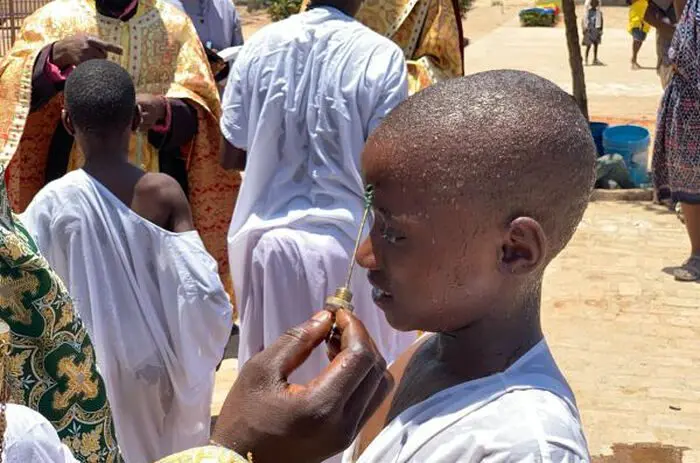The number of Orthodox Christians on the African continent continues to grow steadily. Mass Baptisms here have already become the rule rather than the exception, and sometimes entire localities are converted.
Last Saturday, 140 people united with Christ in the sacrament of Baptism in the Arusha and Central Tanzanian Diocese of the Patriarchate of Alexandria, Orthodoxia news agency reported. Over the past month, more than 500 people have received Holy Baptism in the United Republic of Tanzania.
People of all ages, even from remote villages, come to receive baptism at the hands of Bishop Agathonikos (Nikolaidis) of Arusha and Central Tanzania.
And last week, good news came from the inaccessible village of Mobe, Iringa region, almost all of whose population converted to Orthodoxy. In this remote village, zealous Orthodox converts have built themselves a church of bamboo and straw.
The road to the village of Mobe is practically impassable: it constantly winds along rivers and along rock formations. Therefore, it was impossible to deliver more durable building materials for the temple.
Over the past few weeks, a large number of villagers have been baptized at the diocesan mission center, according to Orthodoxia.
Although the message does not indicate the exact number, the photographs show dozens of Mobe residents gathering to meet Bishop Agathonikos who came to visit them.
On September 19, His Grace celebrated the Sunday Liturgy for newly baptized Orthodox Christians.
At the end of the service, the bishop shared a festive meal with local residents and answered their questions about Orthodoxy.
As a reminder, over 500 Tanzanians received Holy Baptism in February 2019 and another 230 in January 2020. In February 2020, the first Divine Liturgy was served in the first Orthodox monastery of Tanzania (for women – in honor of the Archangel Michael, Great Martyr Mina and Venerable Paisius Velichkovsky in the village of Kidamali), and in September of the same year, a mass Orthodox wedding of representatives of the Masai people took place in the city Arusha.
In January 2021, 80 people were baptized in Kimuli and two weddings were performed, and another 40 Tanzanians were baptized in March.
Meanwhile, at its last meeting on September 23-24, St. The Synod of the ROC has decided to accept under its jurisdiction the “numerous clergymen of the Patriarchate of Alexandria” who have applied to join the Russian Orthodox Church – the Moscow Patriarchate will establish its parallel structure in Africa.
The official statement reads:
“Taking into account the numerous appeals of clergymen of the Orthodox Church of Alexandria to His Holiness of Moscow and All Russia Patriarch Kirill with a request for their acceptance under the omophorion of the Moscow Patriarchate, he instructed His Eminence Archbishop Leonid of Vladikavkaz and Alaniа to investigate and report to the Synod.
Already last year, Interfax quoted the archbishop. Leonid, Deputy Chairman of the Department for External Church Relations, said that the number of Alexandrian clergy from Africa wishing to pass under the omophorion of the ROC-MP was several hundred. Since then, however, no concrete steps have been taken to join African clerics to the MoJ.
In practice, this means that the Moscow Patriarchate intends to create a parallel structure in the jurisdiction of the Alexandrian Patriarchate, not by establishing its own mission centers, but by attracting clergy of the Alexandrian Patriarchate. The action has a clear criminal character due to the decision of the Patriarch of Alexandria to recognize the autocephalous Orthodox Church of Ukraine. The specific occasion is the concelebration of the Patriarch of Alexandria. Theodore on August 13 with the Kiev metropolite Epiphanius (Dumenko) during a service on the Turkish island of Imvros, led by Patr. Bartholomew.
The Moscow Synod also notes that the co-service of Patriarch Theodore, with “the head of the schismatic structure in Ukraine,” further deepened the rift between the Moscow Patriarchate and the Alexandrian Church.
The ROC also tried to open its parishes in Turkey to demonstrate its entry into the jurisdiction of the Ecumenical Patriarchate in response to its “disregard for its canonical borders in Ukraine,” but failed to meet the support of the Turkish authorities and individual cases of service in Russian. clerics among the Russian diaspora remained isolated.
It is very likely that this intention of the ROC will remain on paper, for the purposes of public controversy with the Ecumenical Patriarchate.






